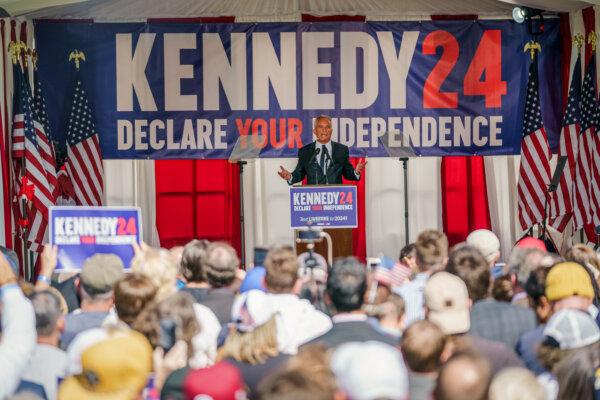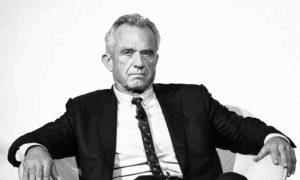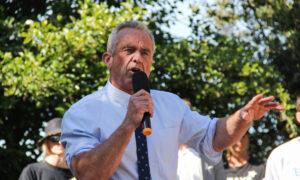The independent presidential candidate established ‘We The People’ in January to gain ballot access advantages in certain states.
Robert F. Kennedy Jr. is now on the 2024 presidential general election ballot in three states.
Mr. Kennedy’s campaign announced on Feb. 23 that the Hawaii Office of Elections confirmed he had collected the mandated 862 valid signatures from registered voters to create the “We The People” party in Hawaii and qualify for ballot access.
Supporters submitted more than three times the required number of signatures, according to Mr. Kennedy’s campaign.
“Mahalo to the people of Hawaii who made this great accomplishment possible. I’m inspired by how enthusiastic people are to collect signatures, create new political parties, and rally for real change. This kind of energy is what will get us onto the ballot in every state and fuel our voter registration and GOTV (Get Out the Vote) operation as we head toward election day,” Mr. Kennedy said in a statement.
Utah was the first state where Mr. Kennedy qualified to appear on the ballot. In New Hampshire, he also collected more than 5,000 signatures in one day to meet their guidelines for ballot access.
Multiple states give independent presidential candidates two methods of achieving ballot access; as an individual candidate or as the nominee of a new party, Mr. Kennedy’s campaign said in a press release.
The two processes often require different numbers of signatures, the campaign explained.
“In most states, the individual candidate process requires fewer signatures. However, in some states, party ballot access requires fewer signatures and is therefore the most direct path to ballot access in those states,” the campaign noted.
In January, Mr. Kennedy’s campaign filed paperwork to create a new political party in those states that require fewer voter signatures for candidates affiliated with a party.
Those states are California, Delaware, Hawaii, Mississippi, and North Carolina, where Mr. Kennedy’s campaign has formed the “We the People” party. Another one is Texas where the Kennedy 2024 campaign has established the “Texas Independent Party.”
The party must collect and submit a minimum of 13,865 signatures in North Carolina to be recognized.
However, in California, the party must also register 75,000 people to get ballot access, according to the campaign. Delaware also requires the party to register around 760 voters to get on the ballot.
Once the new party gains ballot access, it can nominate a candidate.
According to updates on Mr. Kennedy’s campaign website, signature gathering for ballot access is underway in Arizona, California, Georgia, Maryland, Michigan, Mississippi, Missouri, Montana, Nebraska, Nevada, North Carolina, South Carolina, West Virginia, and Wyoming.
Mr. Kennedy must also name a running mate to submit petitions in 21 states. Signature collection has not started in the remaining states.
A Form of Voter Suppression
Getting on the ballot in every state and the District of Columbia is grueling, time-consuming, and expensive, Mr. Kennedy said.
Guidelines for securing a ballot spot and deadlines differ in many states. North Carolina and Texas, for example, require independent candidates to file by mid-May. Multiple states have summer deadlines.
Some states have varying guidelines about the number of signees in different parts of their state.
Mr. Kennedy also expects legal challenges from Democrats and Republicans to keep him off the ballot. Signatures can be challenged after they’ve been submitted to election offices in multiple states.
Filing for political party status in the six states reduced the number of signatures required for Mr. Kennedy to gain ballot access by about 330,000, according to a statement by his campaign.
To gain ballot access in all 50 states and the District of Columbia, Mr. Kennedy noted, his campaign must submit about 1 million valid pen-and-paper signatures through petitions across the country.

“Effectively, this means closer to 1.5 million to ensure that enough are valid,” Mr. Kennedy said.
Mr. Kennedy has called ballot access laws for independent and third-party candidates “among the worst forms of voter suppression in America today” and said that state officials should work together to “streamline and standardize ballot access procedures.”
Ballot access restrictions “artificially prop up the two-party duopoly,” Mr. Kennedy said, noting that a Gallup poll conducted in September 2023 showed that 63 percent of American adults agree that “the Republican and Democratic parties do such a poor job of representing the American people that another choice is needed.”
Standing in front of the National Constitution Center with the words “We the People” etched into the building by his side, Mr. Kennedy announced in Philadelphia on Oct. 9, 2023, that he would run for president as an independent and leave the Democratic primary, which he said was “rigged” by the Democratic National Committee.
Mr. Kennedy’s campaign noted in a press release that “We the People” are the first three words in the U.S. Constitution and “these words symbolize that our government draws its power from the people that it was created to serve.”
At that event, Mr. Kennedy said he was “declaring independence” from the Democratic Party, the two-party system, and “the corrupting influence of Wall Street and corporate donors that have rigged our economy for the few at the expense of the many.”
Libertarian Option
While his effort to get on the ballot in all 50 states and the District of Columbia as an independent continues, Mr. Kennedy has hinted that he could run for president as a Libertarian.
On Feb. 24, he is scheduled to make a keynote speech and appear on a presidential candidate panel at the Libertarian Party of California’s annual convention.
During an interview with CNN’s Michael Smerconish that aired earlier this month, Mr. Kennedy was asked if there was a possibility that he would seek the Libertarian Party nomination. That option would likely assure him ballot access across the country as the Libertarian Party reached that objective in 2016 and 2020.
“We are talking to the Libertarian Party. I feel very comfortable with most of the values of the Libertarian Party, and like I say, we have good relationships. I’m talking regularly to libertarian groups. So, we’ll continue to do those talks,” Mr. Kennedy said.
Angela McArdle, chair of the Libertarian party, met with Mr. Kennedy before the candidate decided to run as an independent last October.
“We’ve had a lot of good conversations and we’re on good terms. And I respect his decision to want to go independent. Though libertarians really admire the strong position he took against mandates and lockdowns, and so we’re going to stay on friendly terms and see what happens,” Ms. McArdle said.
The party will hold its national convention from May 24 to May 26 in Washington.
Unlike Democrats and Republicans, the Libertarian Party selects its nominee based on votes from registered delegates at the national convention.
Original News Source Link – Epoch Times
Running For Office? Conservative Campaign Consulting – Election Day Strategies!


